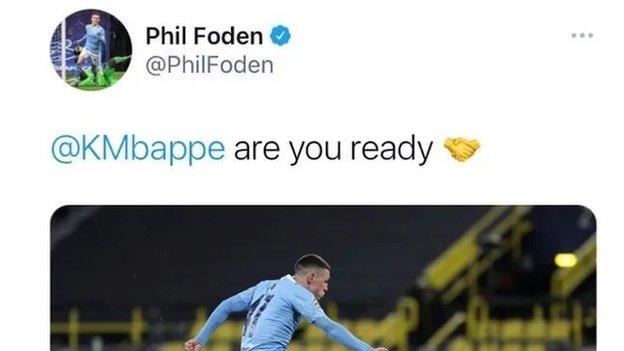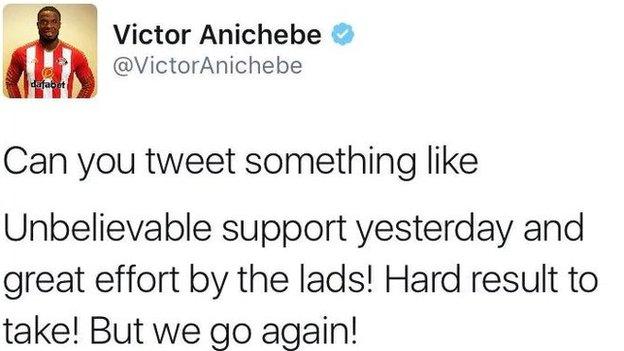
[ad_1]

Just hours after Bruno Fernandes skied his penalty over the Aston Villa crossbar on Saturday, he joined the latest social media trend – the player apology post.
His Manchester United team-mate Jesse Lingard had done likewise 11 days earlier, when his bad backpass gifted Young Boys victory over the Red Devils.

But former United player Gary Neville, now a Sky Sports pundit, is not impressed – describing such posts as “embarrassing”.
Writing on Twitter, Neville said: “They need to sack their PR people, speak with some authenticity and get on with it. They’ve all got these comms managers that are creating personalities that don’t exist.”
He added the “apology culture engulfing football” was being used as smokescreen for bad performances by public relations “experts”.

BBC Sport cannot verify whether Lingard or Fernandes manage their own social media accounts, but the use of PR firms by Premier League clubs and footballers is a widespread industry.
In the minutes after Manchester City beat Borussia Dortmund in the Champions League quarter-finals last season to set up a semi-final with Paris St-Germain, a message appeared on Phil Foden’s Twitter account asking PSG striker Kylian Mbappe: “Are you ready?”

The post was quickly taken down, but not before it had gained thousands of interactions and was screenshotted and reposted. It was later reported Foden had sacked his social media management company for posting it.
Where these companies can be helpful for players, though, is as a buffer for abuse – last season English football held a four-day boycott of social media to highlight the racist and other abusive messages sent on social media platforms.
Here BBC Sport looks into who is really in control of players’ social personas.
‘Losing authenticity’?

A large number of elite players and athletes around the world use companies to take advantage of the growing power of social media, to boost their brands, and ultimately make money.
One example the BBC has been told about is a player who built a large following on Twitter because of a string of engaging posts, but whose account was in fact run by a social media expert as the player could not speak English.
An industry expert, who runs the account of a Premier League player, said: “Players use media agencies to manage their social media accounts as they aren’t always the best in communicating their brands across to fans.
“That’s why they use professionals as they are better at getting the message across. Using professionals is great for the message but can lead to them losing authenticity.”
Neville first targeted this trend after England’s victory over Albania in a Euro 2020 qualifier in March 2020 – writing: “Reading some of the England players tweets last night. Do any of the lads post themselves? They don’t sound authentic.
“It’s a real shame they don’t manage their personal connection to the fans and media. #independentthinkers”
And after the Foden incident, he wrote: “I mentioned on here a few weeks ago about players having their accounts run by social media companies. Lads, run your own accounts! Your independent thought and authenticity is at stake. It’s your voice, not anyone else’s.”
Though Neville and others have criticised players’ use of social media, several of the current generation of English footballers have been praised for their social awareness – including Jordan Henderson supporting LGBT inclusivity, and Marcus Rashford campaigning on food poverty – and speaking out on issues, including on their personal accounts.
Why do players use these services?
Manchester United forward Cristiano Ronaldo has 349 million Instagram followers, and it has been reported he made more than £41m in the 12 months leading up to June 2020 on that platform alone.
It’s big business.
And BBC Sport has been told the majority of clubs within the Premier League will have players who employ such people to manage their online presence.
Money isn’t the only reason. Because of the size of some players’ followings on social media, it’s inevitable brands will want to partner with them – and they will expect sponsored posts.
That brings an element of pressure to ensure contractual obligations are met, and it is safer for players to give that to someone who is an expert in the field.

View from the inside
Most clubs around Europe have in-house media teams. That, along with the demand for players to have social content, changes the way players act around the training ground.
BBC Sport has been told by sources in the industry that should a player do something spectacular in training, many will point to the nearest cameraman to ask if they have footage to post on their social media pages.
It can cause arguments between team-mates, especially if someone is on the end of an embarrassing nutmeg.
And on a match day you can spot the players who are managed – some posts will be up so quickly the player has barely left the pitch, let alone had time to find a professional sourced image and come up with an engaging caption.
Sam Jordan was the social media manager at Crystal Palace from 2015-2019 and saw the number of players using social media managers grow during that time.
In his former role, Jordan would be asked to send pictures from matches or training clips to social media agencies to post for their clients.
He recalls one occasion when he was introduced to a high-profile signing’s social media manager over Facetime in the early hours of the morning.
“Some of them have these grand designs on rebuilding the player’s brand and, I guess, commercialising almost everything they do in some aspects,” says Jordan.
“Others are much more attuned to it being a tool for engaging with fans.”
Speaking about the racist and abusive messages players receive, Jordan says: “I’m not surprised that some of them decide they want that buffer, so someone who’s employed to sift through all that and just be like: ‘Nobody needs to see this.'”
Jordan says it can be beneficial for players to have experts running accounts but it can sometimes “appear disingenuous”. He says it is obvious it has been posted by a third party if it is “really, really polished and there’s almost no hint of the character that we will see every week on the pitch”.
“Everyone does, and I know it’s a joke, the ‘we go again’ post every week,” he says.
“It gets to the point where it’s almost like that Anichebe one where it was ‘can you tweet something like?’ and then there’s the copy that should be there.
“I get being visible, but as a football fan I don’t really know who that’s for. It’s sort of just an easy numbers play or I guess keeping you in people’s thoughts.
“I think the disingenuous angle is the only thing that I’m not on board with. Sometimes I think it’s not that bad if you tweet and have some typos, everyone will forgive you.”
It’s all a far cry from Wayne Rooney’s infamous 2011 tweet. Simpler times.


[ad_2]
Source link